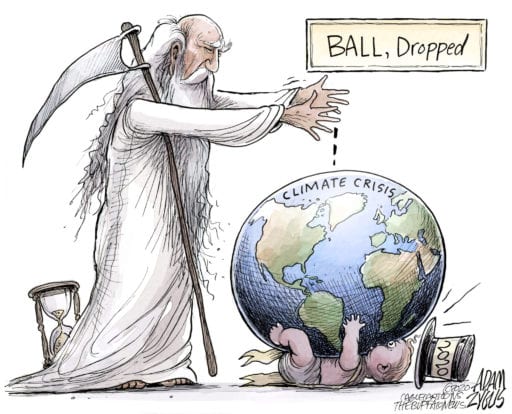Climate change and the ecological and economic damage it inflicts creates a vicious cycle that if left unchecked will spiral humanity into climate chaos, endless wars, and the demise of human civilization as we know it.
As humanity experiences the ever-growing negative effects of climate change, some communities and some regions are affected more detrimentally than others, creating a lack of access to food, water, other vital necessities, and in some cases even the loss of habitable land.
This inevitably creates conflicts among nations and within nations. It is not surprising that these conflicts often break out along racial, religious, and national divisions where tensions have often existed for years, decades, and in some cases centuries.
As access to vital necessities and viable livelihoods diminish, people tend to group themselves along traditional lines of race, religion, or nation to deal with the perceived threat of the other in the competition for a viable existence. It is no wonder that in such a climate we would see a resurgence of race-based and religiously-based nationalism.
In the United States we see this resurgence in the widespread rejection of refugees, the building of walls, anti-Islamic and anti-Semitic attitudes and actions, America First rhetoric and policies, and the dismantling of agreements for international cooperation. This rise in nationalism is not only happening here; it is a global phenomenon.
We find ourselves in a time in which international cooperation to address our social and ecological challenges is needed more than ever before, yet the networks and channels for such cooperation are breaking down under nationalistic pressures and tensions. In such a context, short-term economic advantage trumps concerns for long-term ecological sustainability, the commodification of nature is accelerated, and oligarchical greed for profit and power runs rampant in the midst of a vacuum left by a lack of cooperative global economic and political structures and regulations.
What we are seeing is that the climate crisis and race-based and religiously-based nationalism are mutually reinforcing phenomena. Both must be overcome simultaneously for humanity to have a chance at survival.
The second decade of the 21st century will be remembered primarily for two things: 1] pathetic inaction to address the climate crisis and 2] the resurgence of race-based and religiously-based forms of nationalism around the world. Both phenomena pose an existential threat for people and the planet.
The third decade of the 21st century must address and overcome these two threats if humanity is to have hope for preserving a livable climate for human civilization and creating a just future for all persons in a pluralistic society.
The past decade was the warmest decade on record, approaching a full degree Celsius above pre-industrial global temperatures. Democracy is waning globally and more and more countries are being led by authoritarians, many with nationalist leanings. Climate scientists are warning that we have 10 years within which to take the action required to avoid catastrophic climate change.
This is the decade, we are the people. We will either be remembered as the greatest generation or the one that let it all burn down.








